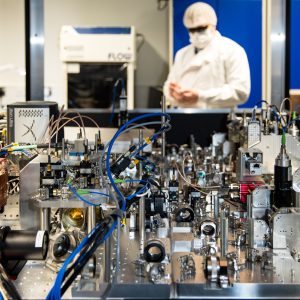
Quantum startup IonQ has launched its latest quantum machine on Amazon Braket, the AWS service which is geared towards offering the cloud platform’s customers access to quantum computing.

Speaking at a quantum computing conference on Wednesday, Amazon Braket general manager Richard Moulds said it was the first time two generations of the same machine had been available at the same time.
IonQ Aria is a 25-qubit trapped-ion quantum computer that has error mitigation built-in. This means that users can opt to have longer processing times in return for greater accuracy in the results.
Aria will be on the platform alongside the 11-qubit IonQ Harmony device, which has been available since Braket launched.
IonQ addition helps customers plot quantum roadmap
Mould told delegates at the Commercialising Quantum conference in London: “This is the first opportunity to have two devices from two generations from the same manufacturer on the same service. It will allow our users to engage in velocity. Customers ask when will it get useful, having two generations on the same curve is a great way for customers to plot that trajectory.”
Trapped-ion quantum computers work by encoding quantum information in the electronic spin state of a charged atom. These are then confined in an electromagnetic trap. It runs through a series of entangling gates.
Aria uses a technique that allows for gates to be performed between any quoit pair in the device which can then reduce complex circuits and minimise errors. This function can be turned on or off with a line of code. Using it increases the time to complete a calculation.
Quantum computers and error mitigation
Quantum computers available today are error-prone and “noisy”, meaning they suffer from outside interference making results harder to calculate.
Another form of error mitigation can come in the form of a cycle between classical and quantum hardware. A classical machine is used to determine the best parameters for the quantum hardware, which then continuously feeds back in a loop until errors are removed.
This is one of the reasons Mould believes “quantum computing will always involve classical computers”. He explained: “They will act as code processors for classical systems”, adding: “It is interesting to think about the interplay between classical and quantum systems. We will have hybrid workloads for training quantum algorithms that can mitigate its own errors. But this needs large chunks of classical compute.5
Amazon Braket offers quantum computers from IonQ, Oxford Quantum Circuits, Xanadu, Rigetti and IQuEra, accessed through the AWS cloud. The other cloud hyperscalers – Microsoft Azure and Google Cloud – also offer a range of quantum choices for companies and researchers wanting to experiment with early versions of the next-generation hardware as demand among businesses for quantum technology grows.






